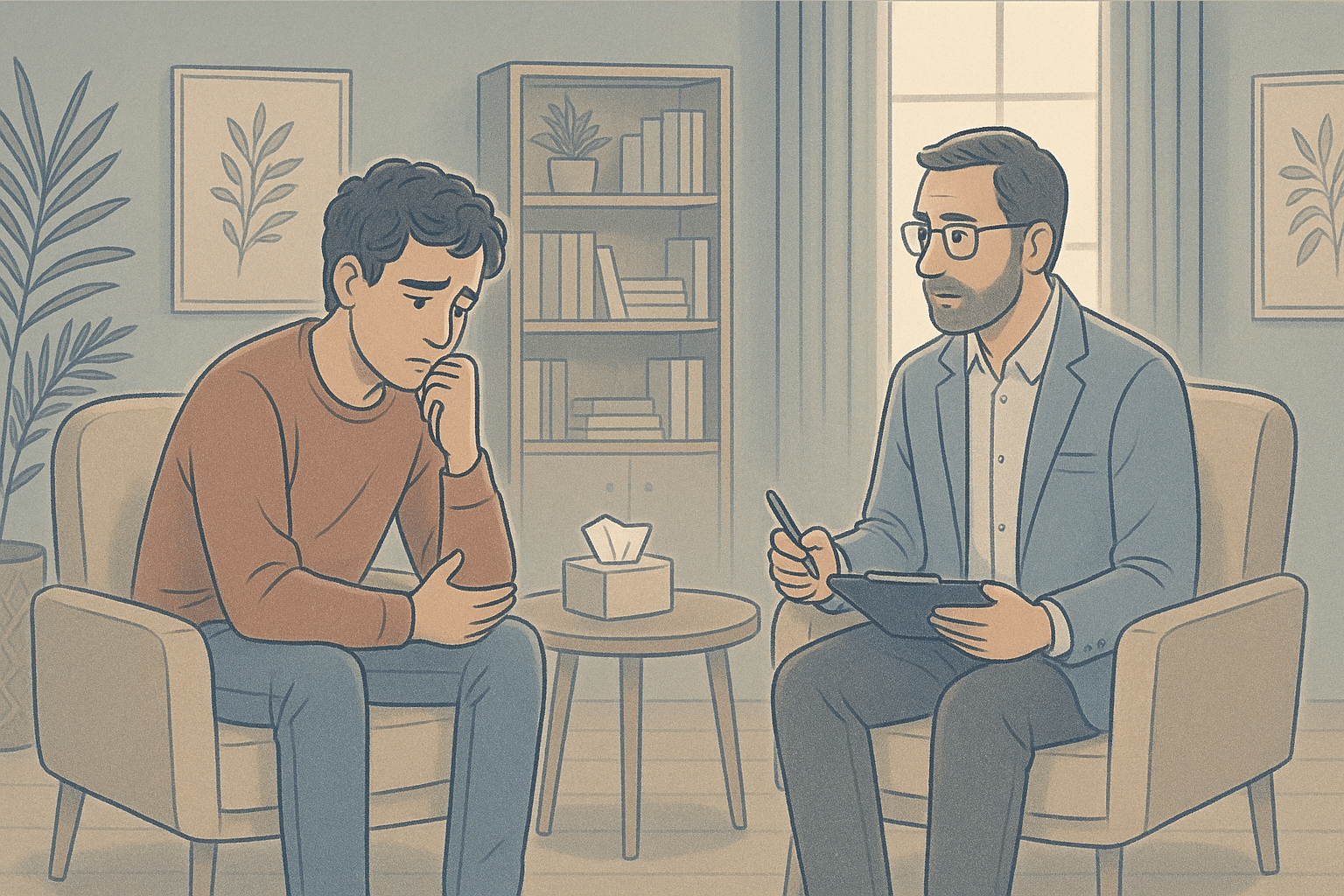Key Takeaways
- Delusional disorder features fixed false beliefs (delusions) that could seem plausible, while paranoid personality disorder involves persistent patterns of suspicion and mistrust without concrete delusions.
- People with delusional disorder often function normally in areas unrelated to their delusion, whereas paranoid personality disorder affects broader social functioning.
- Treatment approaches differ significantly. Delusional disorder typically responds to antipsychotic medications, while paranoid personality disorder primarily requires long-term psychotherapy.
- The onset and progression of these disorders differ, with delusional disorder often appearing suddenly in middle to late adulthood versus the gradual emergence of paranoid personality traits in early adulthood.
- A Mission For Michael offers comprehensive assessment and individualized treatment for the full spectrum of paranoid conditions. Our integrated approach combines evidence-based medications, specialized psychotherapy, and supportive services customized to each disorder’s unique requirements.
Spotting the Key Differences
When comparing delusional disorder and paranoid personality disorder (PPD), several fundamental differences emerge. Delusional disorder centers around specific, fixed false beliefs, while paranoid personality disorder manifests as a pervasive pattern of distrust and suspiciousness. Think of delusional disorder as having concentrated areas of irrationality amid otherwise normal functioning, whereas paranoid personality disorder represents a more global pattern affecting how a person interprets nearly all interactions.
Nature of Paranoia
In delusional disorder, paranoia manifests as concrete, fixed beliefs that persist despite contradictory evidence. These delusions, while technically false, often involve scenarios that could theoretically happen in real life (like being followed or poisoned). The individual’s paranoia is concentrated in specific areas related to their delusion, while they may function normally in unrelated aspects of life.
Conversely, paranoid personality disorder involves a more generalized suspiciousness. Rather than having specific delusions, people with PPD interpret neutral or benign actions as threatening or malicious across various contexts. This suspicion colors nearly all interpersonal interactions and represents a long-standing pattern rather than discrete episodes of paranoid thinking.
Fixed Delusions vs Suspicious Personality
The hallmark of delusional disorder is the presence of one or more non-bizarre delusions that persist for at least one month. These are firmly held beliefs that don’t change despite clear evidence to the contrary. For example, someone might believe their spouse is unfaithful despite no evidence, or that the government is monitoring them specifically.
Paranoid personality disorder, meanwhile, doesn’t necessarily involve concrete delusions. Instead, it manifests as a persistent pattern of distrust and suspiciousness where others’ motives are interpreted as malevolent. This might include recurring suspicions about loyalty, fears of exploitation, or reluctance to confide in others due to unwarranted fears that information will be used against them.
Functional Impact Comparison
The impact on daily functioning differs significantly between these disorders. People with delusional disorder often maintain relatively normal functioning in areas unrelated to their delusion. Their social and occupational functioning may be preserved, especially in contexts where their delusional beliefs aren’t triggered or relevant.
By contrast, paranoid personality disorder typically causes significant impairment across various life domains. The pervasive suspiciousness makes forming and maintaining relationships extremely difficult. Work environments often become challenging as the individual perceives threats, criticism, or conspiracy where none exists. This global impact on functioning is a key differential factor.
Founded in 2010, A Mission For Michael (AMFM) offers specialized mental health care across California, Minnesota, and Virginia. Our accredited facilities provide residential and outpatient programs, utilizing evidence-based therapies such as CBT, DBT, and EMDR.
Our dedicated team of licensed professionals ensures every client receives the best care possible, supported by accreditation from The Joint Commission. We are committed to safety and personalized treatment plans.
Delusional Disorder Explained

Delusional disorder is characterized by the presence of one or more non-bizarre delusions that persist for at least one month.
Unlike more severe psychotic disorders like schizophrenia, people with delusional disorder generally don’t experience hallucinations, disorganized speech, or significant functional impairment outside the context of their delusion. In fact many individuals with this condition can maintain relatively normal lives when their delusional beliefs aren’t triggered.
Core Symptoms
The primary feature of delusional disorder is the presence of fixed, false beliefs that remain despite contradictory evidence. These delusions typically involve situations that could occur in real life, such as being poisoned, followed, infected, loved from a distance, or deceived by a partner.
What makes these beliefs pathological is their intensity, implausibility, and the individual’s unwavering conviction despite clear evidence to the contrary.
Types of Delusions
1. Persecutory Delusions
The most common subtype involves beliefs that one is being conspired against, cheated, spied on, followed, poisoned, or harassed. These individuals might believe government agencies are monitoring them, neighbors are plotting against them, or colleagues are sabotaging their work. They often take measures to “protect” themselves from these perceived threats, which can sometimes lead to legal problems or social isolation.
2. Grandiose Delusions
This subtype features beliefs about having exceptional abilities, wealth, or fame. The person might believe they have made an important discovery, have special connections to prominent figures, or possess unique powers or talents that remain unrecognized. Unlike the fleeting grandiosity seen in some mood disorders, these beliefs are fixed and enduring.
3. Jealous Delusions
People with this subtype are convinced that their spouse or partner is unfaithful, despite having no evidence or having only minimal and circumstantial “evidence.” They often go to extreme lengths to “investigate” the perceived infidelity, including following their partner, checking their belongings, or hiring private investigators.
4. Somatic Delusions
These involve beliefs about having a physical defect, disorder, or disease. The individual might be convinced they have a serious illness despite medical reassurance, believe they emit a foul odor, or think they have parasites beneath their skin. These delusions differ from hypochondriasis in their fixed nature and resistance to medical evidence.
Paranoid Personality Disorder Uncovered
Paranoid personality disorder (PPD) represents a pervasive pattern of distrust and suspiciousness of others, interpreting their motives as malevolent. Unlike the specific delusions seen in delusional disorder, PPD involves a general mindset that colors nearly all interpersonal interactions. This condition typically begins by early adulthood and manifests across various contexts in a person’s life.
Defining Characteristics
Individuals with PPD are constantly on guard, expecting others to exploit, harm, or deceive them. They question the loyalty of friends, family, and partners without justification. This persistent suspiciousness leads them to find hidden meanings in benign remarks or events, often perceiving attacks on their character that aren’t apparent to others.
People with PPD tend to bear grudges and are unwilling to forgive perceived insults or slights. They react quickly and angrily to perceived attacks and can be pathologically jealous, questioning without justification the fidelity or trustworthiness of their partners. This hypervigilance for potential threats creates a self-fulfilling prophecy, as their suspicious behavior often provokes negative reactions from others, which they then interpret as confirmation of their fears.
How It Affects Relationships

The impact of paranoid personality disorder on relationships is profound and pervasive.
If you experience PPD, you may struggle to form close, trusting bonds with others due to persistent suspiciousness. Relationships often become strained as the person with PPD repeatedly tests others’ loyalty, misinterprets neutral actions as hostile, and reacts defensively to perceived slights.
Partners, friends, and family members frequently report feeling like they’re “walking on eggshells” around the person, never knowing what might trigger suspicion or anger.
Everyday Examples
Some daily examples that you or your loved one may be experiencing PDD include:
- Refusing to confide in others due to unwarranted fear that the information will be used against you.
- Reading threatening meanings into benign remarks (e.g., interpreting “you look tired today” as an attack on competence).
- Questioning a partner’s whereabouts and demanding “proof” of activities.
- Perceiving coordinated attacks in routine workplace feedback.
- Maintaining emotional distance in relationships to protect against anticipated betrayal.
Delusional Disorder vs Paranoid Personality Disorder: Overall Differences
| Feature | Delusional Disorder | Paranoid Personality Disorder (PPD) |
|---|---|---|
| Core Symptom | One or more fixed, non-bizarre delusions (e.g., being followed, poisoned, deceived) lasting at least 1 month | Pervasive pattern of distrust and suspicion without fixed delusions |
| Nature of Paranoia | Paranoia is specific and tied to concrete, persistent delusional beliefs | Generalized suspiciousness affecting nearly all relationships and situations |
| Onset | Sudden, often in middle to late adulthood | Gradual, typically beginning by early adulthood |
| Functioning | Generally normal outside of delusional context; impairment limited to areas affected by delusion | Global impairment across social, occupational, and interpersonal domains |
| Insight | Poor insight into the delusional belief, but may recognize normalcy elsewhere | Limited insight; rarely recognizes suspiciousness as excessive, often blames others |
| Examples | Believing a neighbor is spying on you despite no evidence | Distrusting coworkers, reading threats into neutral comments, questioning loyalty of friends/partners |
| Relationship Impact | Specific relationships may be affected if related to the delusion | Widespread difficulty forming and maintaining close relationships due to chronic suspicion |
| Other Symptoms | No prominent hallucinations, disorganized speech, or negative symptoms | May hold grudges, be quick to anger, reluctant to confide, pathologically jealous |
| Treatment Approach | Antipsychotic medications, targeted psychotherapy (CBT for psychosis) | Long-term psychotherapy (CBT, schema therapy); medications only for comorbid symptoms |
| Prognosis | Can maintain normal life if delusions are not disruptive; may respond to medication | Chronic, with slow progress; improvement possible with sustained therapy |
Treatment Approaches
Medication Strategies
Pharmacological interventions play different roles in the treatment of these disorders. The evidence base and typical approaches vary considerably between conditions.
1. Antipsychotics for Delusional Disorder
For delusional disorder, antipsychotic medications are often the first-line treatment. Second-generation (atypical) antipsychotics like risperidone, olanzapine, or aripiprazole may help reduce the intensity of delusions.
These medications work by regulating dopamine and serotonin, neurotransmitters involved in psychotic symptoms. Response to medication can vary significantly between individuals, and finding the right medication and dosage often requires a period of careful adjustment and monitoring.
2. Medication for PPD
By contrast, there are no medications specifically approved for treating paranoid personality disorder itself. Pharmacotherapy for PPD typically targets associated symptoms or comorbid conditions rather than the personality structure.
For example, selective serotonin reuptake inhibitors (SSRIs) might be prescribed for co-occurring anxiety or depression, while low-dose antipsychotics might occasionally be used for severe paranoid thinking that approaches delusional intensity.
Therapy Options

Psychotherapeutic approaches are crucial for both conditions but differ in focus and technique.
For delusional disorder, Cognitive Behavioral Therapy (CBT) adapted for psychosis can help individuals examine evidence for their beliefs and develop coping strategies for managing delusional thoughts. The therapeutic relationship must be built carefully, as challenging delusions directly can damage rapport and trust.
For paranoid personality disorder, long-term psychotherapy is the cornerstone of treatment. Approaches may include schema-focused therapy, which addresses core beliefs about others’ untrustworthiness, or Dialectical Behavior Therapy (DBT), which helps with emotional regulation and interpersonal effectiveness.
Progress is typically gradual, requiring consistent engagement over an extended period. The therapeutic relationship itself becomes a vehicle for challenging the client’s paranoid interpersonal style in a safe environment.
Support Systems
The involvement of family and loved ones in treatment can be invaluable. However, this must be done carefully due to the suspicious nature of these conditions. With proper consent, family education can help relatives understand the disorder and develop appropriate responses to paranoid behavior.
Support systems also extend to the broader community, including healthcare providers, social services, and peer support networks. Building a comprehensive support system helps address the multiple domains of functioning that may be affected by these disorders.
Expert Diagnosis and Treatment at AMFM
At A Mission For Michael, our experienced clinical teams across California, Virginia, and Washington specialize in the comprehensive assessment and treatment of paranoid conditions.

Our modern facilities provide comfort and serenity that aids treatment.
We understand that the suspicious nature of these disorders can make treatment particularly challenging, which is why we’ve developed specialized approaches for building trust and fostering therapeutic relationships.
Our integrated treatment approach combines evidence-based medications, specialized psychotherapy techniques, and comprehensive support services customized to each disorder’s unique characteristics.
If you’re dealing with the fixed delusions of delusional disorder or the pervasive suspiciousness of paranoid personality disorder, our clinicians provide individualized care that addresses both immediate symptoms and long-term functioning.
Frequently Asked Questions
Can someone have both delusional disorder and paranoid personality disorder?
While these disorders are distinct diagnostic entities, they can co-occur in some cases, though this is uncommon. More typically, individuals with paranoid personality disorder may occasionally develop more intense paranoid thinking that approaches delusional intensity, particularly during periods of high stress. Treatment requires an integrated approach addressing both conditions simultaneously.
Is paranoid personality disorder hereditary?
Research suggests a moderate genetic contribution, with heritability estimates for cluster A personality disorders ranging from 21% to 42%. The development likely involves a complex interplay between genetic predisposition and environmental factors, particularly childhood trauma, emotional abuse, or unstable early environments.
Can these disorders develop later in life?
While paranoid personality disorder typically manifests by early adulthood, delusional disorder often has a later onset, frequently emerging in middle to late adulthood. New-onset paranoid symptoms in older adults should prompt thorough evaluation, as they may indicate various conditions including neurocognitive disorders or medical conditions affecting brain function.
Do people with these disorders know something is wrong?
Insight varies considerably. People with delusional disorder typically have poor insight into the delusional nature of their beliefs, while those with paranoid personality disorder may recognize interpersonal difficulties but attribute problems to others’ untrustworthiness rather than their own suspicions. With effective treatment, insight can improve over time.
Are delusions always a sign of mental illness?
Not necessarily. Beliefs that might appear delusional must be evaluated within their cultural, religious, and social context. What seems like a delusion in one cultural framework may be entirely normative in another. At A Mission For Michael, our experienced clinical teams across California, Virginia, and Washington carry out comprehensive assessment to ensure proper diagnosis before treatment.













